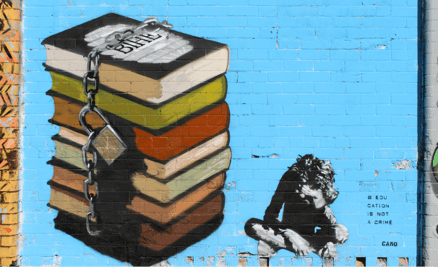July 27th, 2018

Artist: Caňo image source: link
From time to time, we are asked about the status of the Bahá’í Institute of Higher Education (BIHE), Iran, and how to evaluate the credentials of its graduates.
The Baha’is are members of a persecuted religious minority in Iran. The BIHE is not recognized by the Ministry of Education (MOE) in Iran as the Iranian government does not recognize the Bahá’í faith. The followers of the faith face daily persecution and denied access to higher education. The BIHE was formed by former faculty/professors of universities in Iran who were dismissed from their posts and began offering instruction privately. Since one of the key elements of evaluating international credentials is determining the recognition/ accreditation of the institution by the appropriate official body, e.g. MOE, BIHE graduates continue to face challenges.
We came across this excellent white paper, by Mina Yazdani at Eastern Kentucky University. Mina is of the Bahá’í faith and had been a 4th year medical student at Shiraz (Pahlavi) University. She was, like all Iranian Bahá’ís expelled from the university after the victory of the Islamic revolution. Mina’s article is deeply insightful and discusses the history of Bahá’í faith, the persecution of Bahá’ís and origins of the BIHE.
There is a 2014 documentary To Light a Candle, produced by Maziar Bahari, an Iranian journalist and the subject of Jon Stewart’s film Rosewater that focuses on Kamran and Kayvan Rahimian, brothers who studied and later taught at BIHE. Their father was imprisoned, tortured and killed by the regime at the beginning of the 1979 Iranian Revolution for sheltering other Bahá’ís and for not converting to Islam. The story of the Rahimians is emblematic of the wider Iranian Bahá’í experience.
To Light a Candle has already been screened for the public several hundred times around the world, at locations such as public libraries, university campuses and community centers. The trailer to the documentary is available in this link on YouTube.
The following list of facts is sourced from the Bahá’í Institute for Higher Education’s website: Source: http://www.bihe.org
BIHE at a Glance
- BIHE was founded in 1987
- In the first year of its establishment, 1987, students were accepted in two fields of studies, namely sciences and humanities
- BIHE has five faculties with 5 associate programs, 18 undergraduate degree programs and 14 graduate programs
- BIHE offers over 1050 courses ranging from Persian Literature to Applied Chemistry.
- BIHE has a combined faculty and administrative staff of over 955 members
- An average of 1000 students apply to BIHE every year
- BIHE greatly benefits from its Affiliated Global Faculty (AGF) – an increasing resource of volunteer professors from around the world that assist with the development, implementation and instruction of the BIHE courses
- BIHE uses a unique combination of online and offline learning
- BIHE currently accepts about 450 students into its first-year programs
- BIHE applicants must conform to the same rigorous academic standards as other students in Iran. They must pass the national entrance exam, and meet all the BIHE academic requirements
- BIHE graduates have been accepted at more than 87 different university graduate programs outside of Iran (for a complete list of universities accepting BIHE graduates, please click here)
BIHE Email: registrar.office@bihe.org
Although the Iranian government does not recognize the BIHE and its degree programs, BIHE has been able to ensure that universities outside Iran accept its students and recognize their studies. Please read the article published by Quartz that shares the story of one Bahá’í graduate who sought admission to the University of California Berkeley’s graduate school which requires a bachelor’s degree from an accredited institution. The University’s Dean of graduate studies chose to make an exception for BIHE and decided “that the requirement would not be held against student applying to be a student in graduate school at the University of California at Berkeley.” The student was admitted and later graduated with the Master’s degree, making her the first BIHE to be admitted to UC Berkeley.
We look forward to hearing news of more BIHE graduates having similar success stories.
Additional Reading & Links:
CNN “Iran Bans Underground University”
https://www.cnn.com/2011/11/10/world/meast/iran-bans-bahai-university/index.html
https://cedar.wwu.edu/cgi/viewcontent.cgi?article=1253&context=jec
Higher Education under the Islamic Republic: the Case of the Baha ’is, by Mina Yazdani
https://cedar.wwu.edu/cgi/viewcontent.cgi?article=1253&context=jec
Closed Doors, Bahá’í World News Service
http://news.bahai.org/human-rights/iran/education/bihe/
Baha’i Blog
http://bahaiblog.net/site/2016/05/notacrime-campaign-a-collection-of-street-art-part-2/
http://bahaiblog.net/site/2012/12/some-background-to-whats-been-happening-to-the-bahais-in-iran/
The Economist: The Bahá’í Faith
https://www.economist.com/the-economist-explains/2017/04/19/the-bahai-faith
Why Yale and Columbia are accepting students from a university that holds classes in a basement in Tehran.
https://qz.com/934700/a-clandestine-university-has-been-educating-bahais-in-iran-for-30-years/

The Academic Credentials Evaluation Institute, Inc. (ACEI), was founded in 1994 and is based in Los Angeles, CA, USA. ACEI provides a number of services that include evaluations of international academic credentials for U.S. educational equivalence, translation, verification, and professional training programs. ACEI is a Charter and Endorsed Member of the Association of International Credential Evaluators. For more information, visit www.acei-global.org.

it is so sad but I cheer Bahai members in Iran to not care but just only to prove themselves to what Bahaullah expect from us.